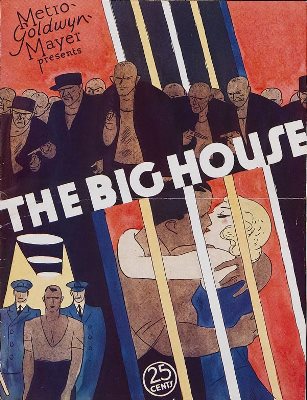
THE BIG HOUSE
US, 1930, 87 minutes, Black and white.
Chester Morris, Wallace Beery, Lewis Stone, Robert Montgomery, Leila Hyams.
Directed by George W. Hill.
The Big House won the Oscar in 1930 for best sound engineering and Frances Marion won for best screenplay. The film was nominated for best film and Wallace Beery for best actor.
The film is one of the earliest of Hollywood prison films, quite striking for 1930, with its scope, cinematography, sound engineering and also its themes about prison reform. Lewis Stone plays the warden and has many lines critical of government attitudes towards prisons, wanting to get people into prisons but not giving any attention to them during their internment. The prison of which he is warden has three thousand prisoners. The film’s themes have been echoed in many prison films throughout the decades including films about the uprising in Attica, even to the 1990s film about Attica, Against the Wall.
Wallace Beery gives his usual kind of grizzled performance as Butch, a rather low-intelligence criminal who is genial enough, but has believed the propaganda of how criminals should behave, especially for prison breaks. Chester Morris is the hero, a reformed criminal who escapes, encounters a young woman and her family, turns to some kind of heroism during the prison break and is pardoned. A young Robert Montgomery is the central focus at the beginning of the film, convicted of manslaughter, put in a cell with Beery and Morris, afraid, and becoming a stool pigeon for the authorities.
Some of the sequences in the prison yard are quite spectacularly done, especially for the period. The same is true also of the attempted outbreak and the battle that takes place in the yard.
Direction was by George W. Hill, director of a number of films after being a cinematographer in the silent era, directing Beery in Helldivers and Min and Bill. He was to die in 1934, aged thirty-nine.
1. The impact of the film in its time? Prisons, prison reform? Oscar wins and nominations?
2. The black and white photography, the prison sets (artificial as well as realistic)? The interior of the prison, the yards? The gun battle? The scenes outside the prison, conventional and domestic? The musical score?
3. The title, the nickname for the prison, becoming popular in prison jargon?
4. The film establishing many of the conventions which followed? The arrival of the prisoner, interrogation, changing into prison gear? The cells? The yard, prison activity? Interactions between prisoners? The gangs, the plans, the stool pigeons? The warden, his perceptions of prison reform? The guards? The uprising, the gun battles?
5. The focus on Kent, his crime, drunk, young, arrival, the clothes, the cell? The warden warning him about trouble? His time in prison, standing up to Butch about the cigarettes, Morgan taking his side? In the yards, the people he mixed with? His becoming the stool pigeon? A weak character, blaming others? The final information, Morgan warning him against the uprising, his fleeing, taking refuge with the wardens, coming out, unlocking the gate, his death? His sister and the photograph?
6. Butch, the background of his crime, big and burly, not too bright-witted? With the cigarettes? With Morgan, obeying Morgan? In the yard, pretending to read, the letter about his mother’s death? The bond with Morgan, jokes? The uprising, his leadership? In the chapel, the hymn, the guns? Midday, the gate, the man with the flowers? The attempt to get out, the guards with the machine guns? The gun battle, his attitude towards Morgan, his being shot? Joking?
7. Morgan, the background of his crime, doing his time, strong character, leadership, defending Kent? The friendship with Butch? Plan for escape? His being framed, the knife? His getting out, his plan for revenge, going to Kent’s family, meeting Anne? Her pretending about his identity? Going to work, going straight, his plan, the arrest? His return to jail, trying to do the right thing, warning against the escape? Being summoned by the guards, his heroism in the shootout, saving the guards by locking them in? His being shot? The final words with Butch? His heroism, his being released, a future?
8. The warden, the guards, prison management, stern? Three thousand men? The warden and his sympathy? His tough stand at the end, sending in the troops?
9. Anne, love for her brother, the encounter with Morgan, pretending, with the police? With her family, kissing him goodbye, the happy ending? The Marlowe family, their disappointment with Kent? Their liking Morgan, their hopes?
10. The portrait of the guards – conventional, unsympathetic, Pop as the sympathetic guard? The work of the guards?
11. This kind of prison film becoming the staple of the movie industry?